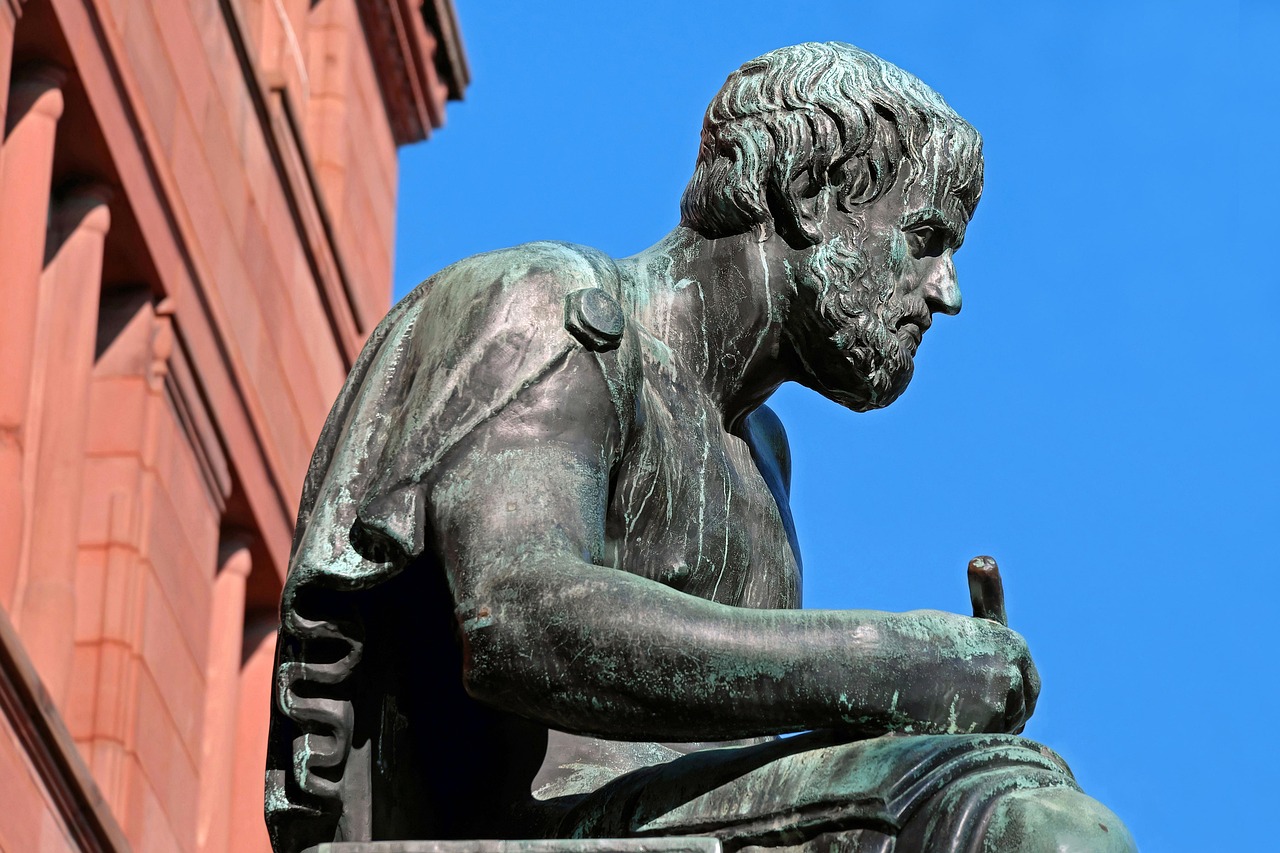Aristotle (384–322 BCE)
Aristotle (384–322 BCE) is one of the most significant figures in the history of Western thought.
A student of Plato and tutor to Alexander the Great, Aristotle’s ideas have shaped intellectual discourse for over two millennia. His work covers a vast array of subjects, and his methodologies and concepts laid the groundwork for much of Western philosophy and science. In this introduction, we will explore the background of Aristotle’s life, the key areas of his philosophy, and his enduring legacy.
Table of Contents
Early Life and Education
Born in the small town of Stagira in northern Greece, Aristotle came from a family with a tradition in medicine, which influenced his later interest in biological studies. At the age of seventeen, he moved to Athens to study at Plato’s Academy, where he would remain for the next twenty years. Although he became one of Plato’s most brilliant students, Aristotle diverged from his teacher in significant ways, particularly regarding Plato’s Theory of Forms. While Plato emphasized the abstract and ideal as the foundation of reality, Aristotle focused on the concrete and empirical.
Aristotle left the Academy after Plato’s death and spent several years traveling and studying natural phenomena. He later returned to Athens and established his own school, the Lyceum, where he taught for the remainder of his life. The Lyceum became one of the most prominent centers of learning in the ancient world, and its influence would extend far into the future through the works of Aristotle and his students.
Logic and the Syllogism
One of Aristotle’s most important contributions to philosophy is his development of formal logic, particularly the concept of the syllogism. Aristotle’s system of logic was the first comprehensive framework for deductive reasoning and remained the dominant system in Western philosophy for over 1,500 years.
A syllogism is a form of reasoning in which a conclusion is drawn from two given or assumed propositions (premises).
For example:
- All men are mortal.
- Socrates is a man.
- Therefore, Socrates is mortal.
This logical structure allows for conclusions to be drawn in a systematic way, and Aristotle used this method to analyze language and knowledge. His Organon (a collection of works on logic) was considered essential reading in the medieval universities of Europe and continues to be foundational in the study of logic today.
Metaphysics: The Study of Being
In his Metaphysics, Aristotle explores the nature of reality, asking fundamental questions such as: What is being? What does it mean for something to exist? His metaphysical inquiry differs from Plato’s in that Aristotle rejects the idea of a separate, immaterial world of Forms. Instead, he asserts that reality is composed of substances—concrete entities that exist in the material world.
Aristotle introduces the concept of “substance” as that which exists independently and supports all other properties or attributes. Substances, according to Aristotle, consist of both matter (the physical stuff) and form (the essential nature or identity of a thing). This theory of hylomorphism—combining matter and form—became a central part of medieval scholastic philosophy.
Additionally, Aristotle introduces the notion of the “unmoved mover,” a concept that attempts to explain the existence of change and motion in the universe. The unmoved mover is a primary cause that itself is not caused by anything else, and it serves as the ultimate principle behind all existence. This idea would later influence theological thought, particularly in the Christian and Islamic traditions.
Ethics and the Good Life
Aristotle’s ethical philosophy, as outlined in his Nicomachean Ethics, is perhaps one of his most enduring contributions. He proposes that the goal of human life is to achieve eudaimonia, often translated as “happiness” or “flourishing.” For Aristotle, eudaimonia is not a fleeting emotional state but a condition of living well and fulfilling one’s potential as a rational being.
Aristotle believed that moral virtues are acquired through habit and practice, rather than through intellectual instruction alone. He introduced the concept of the “golden mean,” which suggests that virtue lies in finding a balanced middle ground between excess and deficiency. For example, courage is the mean between recklessness and cowardice, and generosity is the mean between wastefulness and stinginess.
Aristotle’s ethical theory emphasizes the importance of developing good character traits (virtues) through practical experience and reflection. He argued that living virtuously, guided by reason, is the key to achieving the good life.
Politics: The Ideal State
In addition to ethics, Aristotle also wrote extensively on politics, arguing that human beings are “political animals” by nature. He believed that the state exists to promote the good life for its citizens, and his political theory is closely linked to his ethical views. In his Politics, Aristotle examines different types of political systems, including democracy, oligarchy, and monarchy, and he argues that the best form of government is a constitutional system that allows for a balance of power and a focus on the common good.
Aristotle’s political philosophy emphasizes the importance of moderation and mixed government, where different social groups share power and prevent the rise of tyranny or extreme forms of rule. He was particularly critical of extreme forms of democracy and oligarchy, believing that they often led to instability and injustice.
Legacy and Influence
Aristotle’s influence on Western philosophy cannot be overstated. His works laid the foundation for many areas of thought, from natural science and ethics to political theory and logic. In the medieval period, his ideas were integrated into Christian theology, particularly through the writings of Thomas Aquinas, who referred to Aristotle simply as “The Philosopher.” His influence continued through the Renaissance and the Enlightenment, as scholars revisited his works and used them to shape the modern scientific method.
Today, Aristotle remains a central figure in philosophy, and his ideas continue to inspire debate and exploration. His commitment to observation, logic, and practical ethics resonates with modern thinkers who seek to understand the nature of reality and the human condition.
Weekly Popular
Newsletter
Subscribe to our newsletter to stay up-to-date on our latest news and announcements.







